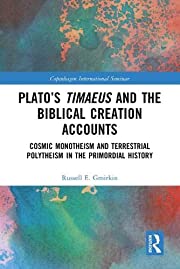
Similarities between the Pentateuch and Greek literature have long been noted and discussed in scholarly literature, but most of those discussions have assumed that the Greeks and the authors of the biblical books were independently drawing on Asiatic stories or even that some Greeks were exposed to translations of parts of the Pentateuch. (Evangelia Dafni is one such scholar who today argues for that latter position; Franz Dornseiff once argued for the former.) Others have flatly denied any serious or significant analogies between the Pentateuch and Greek works, relegating supposed parallels to coincidence or over-active imaginations. That dreaded fourteen letter word comes to mind: “parallelomania“.
Russell Gmirkin [RG] has a new book, Plato’s Timaeus and the Biblical Creation Accounts: Cosmic Monotheism and Terrestrial Polytheism in the Primordial History. My blog posts on his two earlier books are archived at Berossus and Genesis and Plato and the Creation of the Hebrew Bible. I anticipate doing a chapter by chapter review of his new work on Genesis 1-11.
Genesis 1-11 or the Primordial History covers the span of time from Creation and the misadventures of the first humans, through the Flood and up to the Tower of Babel story. It stops prior to the introduction of Abraham and the beginning of Israel’s story. The Primordial History stages characters with enormous life-spans, a talking snake, angels with flaming swords, a god walking the earth, “sons of god” mating with women to produce “men of renown”, a world-wide flood that reminds us of the Epic of Gilgamesh and a divine intervention to confound the languages of humanity and scatter them across the earth. Before all of that we read how God created heaven and earth, beginning with the creation of light days before he made the sun! These chapters are clearly a different type of unit from the rest of the Pentateuch. Where does it all come from?
Even within chapters 1-11 exegetes have long noted a sudden break between the seven-day creation (1:1 to 2:3) on the one hand and the detailed account of the creation of Adam and Eve, the Garden of Eden, (2:4ff) on the other. How did two accounts, one seeming to contradict the other, come to be placed side by side? And what are we to make of the different names of God: Elohim and Yahweh Elohim?
The ideas explored in RG’s new book will be a challenge-too-far for some readers who have been immersed in the Documentary Hypothesis and its assumption that the writings of the Bible evolved over centuries from the time of the biblical kingdoms of Israel-Judah (from 900 BCE) and were more or less completed by the end of the Persian era in the fifth century, that is, before the conquests of Alexander and the onset of the Hellenistic period. This traditional view holds that the first five books of the Bible grew out of the literary matrix of Mesopotamia and Syria-Canaan. Possible Greek influence is not even considered.
In his earlier books RG explored the case for a Hellenistic date for the Pentateuch and this new volume is a continuation of those earlier works. His aim is to see what happens when we compare a wider range of possible influences — adding Greek data into the mix — on the Primordial History. I hasten to point out that RG by no means denies influence from the Levantine-Mesopotamian region. But the devils are in the details when identifying the most likely sources of transmission. It is not an either-or discussion but a modified form of both-and, albeit with some adjustments concerning what the evidence indicates about who was responsible for the transmission and when.
In his opening chapter RG explains
- how he will go about identifying the sources behind the Primordial History
and
- an overview of the history of the scholarly views of Genesis 1-11 and where his own research fits.
